
03:12
Singapore reverses downward-population trend, while Hong Kong exodus continues

Singapore’s economy returned to growth in the third quarter, averting a recession while showing the fragility of post-pandemic prospects as the world outlook darkens.
Gross domestic product in the three months through September rose 1.5 per cent from the previous quarter, the Ministry of Trade and Industry (MTI) said in a statement on Friday. That’s faster than the median estimate for a 0.7 per cent expansion in a Bloomberg survey.
On a year-on-year basis, the economy expanded 4.4 per cent after a revised 4.5 per cent growth in the previous quarter. Survey respondents had predicted a 3.5 per cent growth.
The trade-reliant city state, which leaned on its financial services industry for growth support during the pandemic, is now seeing recovery in more sectors including food and drink and hospitality after a full post-Covid reopening.
Meanwhile, Singapore’s central bank tightened monetary policy settings to keep up its fight against inflation.
The Monetary Authority of Singapore, which uses the exchange rate of the local dollar as its main policy tool, recentered the midpoint of the currency’s policy band up to its prevailing level, according to a statement on Friday. That will allow the Singapore dollar to strengthen, and in turn keep global shocks from feeding into local prices.
MAS’s policy tightening – the fifth since October 2021 – came as inflation data showed no sign of a peak in price gains. The decision also pre-empts the Federal Reserve, which is under pressure to stick with outsize hikes next month after latest US consumer price data showed the core measure rose to a four-decade high.
The MAS had to weigh ongoing effects of a stronger dollar and imported inflation against darkening prospects for the global economy that would prompt a shift to more growth-focused, less tight financial conditions.
“Today’s decision to only recentre likely tries to balance the downside growth risks with the upside inflation risks,” said Khoon Goh, head of Asia research at Australia & New Zealand Banking Group in Singapore.
“It is too soon to say this is the end of the tightening cycle. If Singapore inflation continues to surprise to the upside, then MAS will still need to respond but the hurdle for another re-centering is now very high”
The Singapore dollar has been among the least hit currencies in Asia, depreciating 5.7 per cent against the greenback from the start of the year through the end of Thursday while most of the region’s major currencies have dropped by double digits over the same period.
Singapore officials, including at the MAS, have projected inflation will stay elevated this year and “ease more discernibly in the latter half of 2023.”
The central bank retained its 3 per cent–4 per cent growth forecast for 2022, while narrowing the inflation readings to the top of their previously estimated ranges. Accordingly, core inflation is seen averaging at 4 per cent this year and all-items is seen at 6 per cent.
Officials convening in Washington this week for meetings organised by the International Monetary Fund and the World Bank have painted a bleaker picture of the global outlook, with IMF Managing Director Kristalina Georgieva predicting one-third of the world economy will see recession this year and the next. She warned that global output could decline by US$4 trillion through 2026 – roughly the size of the German economy.